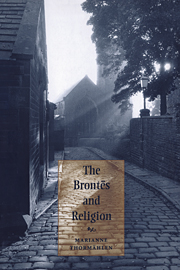Book contents
- Frontmatter
- Contents
- Acknowledgements
- Abbreviations and editions
- Introduction
- I Denominations
- II Doctrines
- Chapter 4 The Brontës in the theological landscape of their time
- Chapter 5 God and his creation
- Chapter 6 Faith and redemption
- Chapter 7 This life and the next
- III Ethics
- IV Clerics
- Notes
- Select bibliography
- Index
Chapter 7 - This life and the next
Published online by Cambridge University Press: 22 September 2009
- Frontmatter
- Contents
- Acknowledgements
- Abbreviations and editions
- Introduction
- I Denominations
- II Doctrines
- Chapter 4 The Brontës in the theological landscape of their time
- Chapter 5 God and his creation
- Chapter 6 Faith and redemption
- Chapter 7 This life and the next
- III Ethics
- IV Clerics
- Notes
- Select bibliography
- Index
Summary
The works, in poetry and fiction, of all three Brontë sisters reflect the conviction that the passion of love is never simply bounded by the span of human life on earth. That passion, variously conceived, lies at the heart of the Brontë novels and resists whatever forces are marshalled against it. Such forces are without exception evil, whether they manifest themselves in the selfish desires of the proud, weak or misguided or in the machinations of the envious and the actively malevolent. Similarly, the power of love is informed and sustained by a goodness whose strength may well be called supra-human. The operations of coincidence may fit into providential patterns, as Thomas Vargish has shown in respect of Jane Eyre. Even in Wuthering Heights, hatred ultimately has to yield to love.
But if love draws its power from beyond earthly existence in all the Brontë novels, certain distinctions emerge when the nature of that beyond is placed under scrutiny. The death of the body is never viewed as the end of a person's life; but the conceptions of an afterlife vary considerably, and the three authors explore them from different standpoints.
THE TENANT OF WILDFELL HALL
Despite the doctrinal audacity of The Tenant of Wildfell Hall, that novel is in one sense closer than any other of the Brontë novels to the view of the last things that prevailed among Evangelical clergy and believers in its day.
- Type
- Chapter
- Information
- The Brontës and Religion , pp. 90 - 116Publisher: Cambridge University PressPrint publication year: 1999



